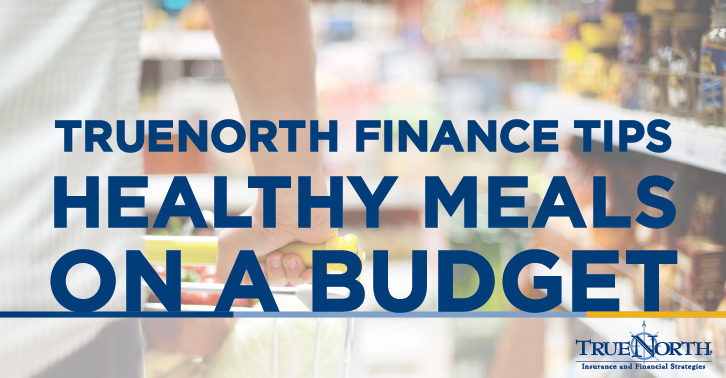Healthy Meals on a Budget
posted by TrueNorth Financial Strategies on Monday, June 20, 2016

Eating healthy on a limited budget may seem impossible, but with a little time, planning and strategic shopping, you can eat healthier and stay within your means.
Importance of Planning
Planning your meals for the week is the best place to start. Planning will help you make sure you are including foods from each food group - pay special attention to serving enough fruits and vegetables in family meals. Also, it helps you achieve a healthy balance - for instance, if you plan to serve a food higher in fat or salt, you can plan low-fat or low-salt foods to go with it.
In addition, planning saves time and money. Making a shopping list helps you know what food you already have, and what food you need - and helps avoid pricey "impulse" buys. Plus, planning your meals means fewer trips to the grocery store and helps you make use of leftover food and ingredients.
Planning Tips
- Build the main part of your meal around rice, noodles or other grains. Use smaller amounts of meat, poultry, fish or eggs.
- Add variety to family favorites and try new, low-cost recipes. There are many online resources for finding healthy recipes.
- Try new ways to cook foods, such as a slow cooker or crock-pot, to make meals easier to prepare.
- Make use of leftovers to save time and money. For instance, if you make a pot roast, serve half of it and freeze the rest to use later in a casserole.
- When time allows, cook large batches of certain meals and freeze family-size portions for meals later in the month.
Tips for Shopping
- After planning your meals, make a list of all the foods you need (don't forget to check the kitchen first!)
- Look for coupons for the foods you plan to buy.
- Avoid convenience foods (fancy baked goods, frozen meals, etc.); you can usually make these at home much cheaper and can control the nutritional value as well.
- Try store brands. They cost less and generally taste as good and have equal nutritional value.
- When buying produce, buy what is in season. Compare fresh, frozen and canned to see which is cheapest.
- Buy only the amount of food that your family will eat before it spoils.
- Read food labels and choose foods with less fat, sodium or calories, and more vitamins, minerals and fiber.
- When your budget allows, buy extra low-cost nutritious foods like potatoes and frozen orange juice concentrate. These foods keep well.
TrueNorth Financial Strategies
For more information and financial guidance, please call TrueNorth at 1-800-798-4080. Our financial advisors would be happy to schedule a consultation with you and your loved ones to make sure the things that matter most are protected and accounted for.
About Author
For more information and financial guidance, please call TrueNorth at 1-800-798-4080. Our financial advisors would be happy to schedule a consultation with you and your loved ones to make sure the things that matter most are protected and accounted for.
... read more about author